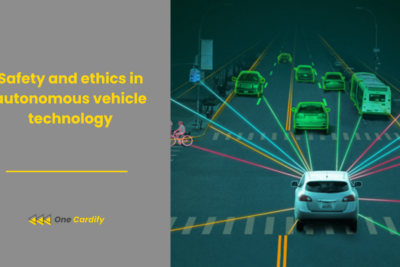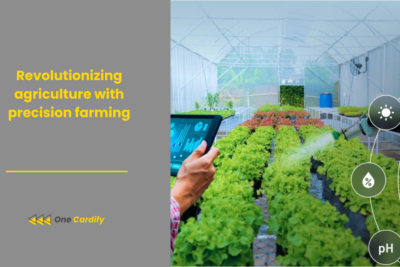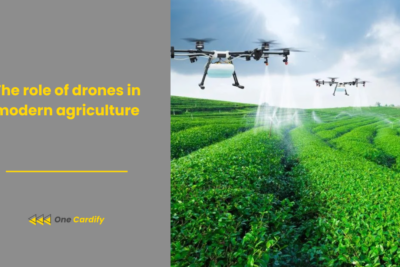
How autonomous vehicles are changing logistics
The logistics industry is being changed by the autonomous vehicles; the transportation and delivery of goods are different all around the world. This change will result in increased efficiency, reduced operational costs, and will have a great effect on the global supply chain. As we enter this new era, it is important to see how these self-driving vehicles are opening the door for a more efficient logics sector.The introduction of autonomous technology in the logistics system does not only change the ways of movement but reorganizes the whole logistics environment. Within the logistics area, there is a significant transformation from automatic warehousing to self-driven trucks and drones.This blog examines the diverse effects of self-driving vehicles on the logistics industry focusing on both the advantages and disadvantages they bring and the future they promise to the global supply chains. Let’s take a trip to discuss how autonomous technology is revolutionizing the standards in the transportation sector.
The Advent of Autonomous Vehicles in Logistics
Inclusion of autonomous vehicles into the logistics sector is a significant shift in logistics towards better and completely autonomous supply chains. These vehicles, which are supplied with the latest navigation and control mechanisms, are preparing the ground for a massive revolution in the way through which goods are transported.Autonomous vehicles will operate 24/7 without human intervention thus are anticipated to significantly improve transportation efficiency reducing in delays and human error. This change improves operational productivity and holds out greater benefits in terms of environmental sustainability by economizing fuel use and cutting down emissions.The dependence on real-time data and machine learning algorithms allows such vehicles to make the necessary judgements on the road so that timely and safe deliveries are being made. In addition, the link with intelligent logistics platforms enables smooth integration of different transport modes, warehousing and delivery services.Nevertheless, there are a number of issues that have to be addressed on the way towards complete autonomy of logistics, including regulatory constraints, technological difficulties, and large start-up expenses. Eliminating these barriers is critical so as to unearth the power of driverless vehicles in revolutionizing logistics.
Related content
Related content
Optimizing Supply Chains with Automation
The development of autonomous vehicles is to automate the supply chain operations, from the collection of raw materials to delivering the finished products. Their imprint on improved logistic processes is inevitable in attaining a higher accuracy and efficiency.Automation of warehousing using autonomous robots and drones, simplifies inventory control and lowers time and labor costs of the old warehousing methods. Such smart systems also guarantee retrieval of accurate stocks and quick order filling thus raising the levels of customer satisfaction.Moreover, self-driving trucks and drones employed for last-mile deliveries offer a way to satisfy a growing requirement for fast and low-priced delivery services. However, this is not only good for the consumers but also presents opportunities to businesses to enhance their logistic process.
Challenges and Future Perspectives
Despite the bright future, autonomous vehicles adoption in logistics has some barriers. These concern regulatory approvals, safety issues, cyber threats, and the requirement for modern infrastructure. Resolving these issues is very important in the creation of a friendly environment for autonomous logistics.Heading into the future, the development of autonomous vehicle technology and its inclusion into the logistics industry are looking as a great opportunity to change the world supply chains. We see future of logistics, in which operational is not only efficient, but also unmatchable reliable and sustainable, when technology is developed further.Collaboration among technology providers, logistics firms, and regulatory authorities will be crucial in addressing the challenges of this shift and packaging the entire potential of autonomous logistics.
Autonomous vehicles, or self-driving vehicles, are equipped with advanced systems that allow them to navigate and operate without human intervention.
They improve efficiency, reduce operational costs, minimize human errors, and enhance the sustainability of logistical operations through optimized fuel consumption and reduced emissions.
Challenges include regulatory hurdles, technological complexities, safety concerns, cybersecurity risks, and the need for substantial infrastructural investments.
Current technology limitation mean that severe weather can affect their operation, however, continuous advancements are being made to improve their all-weather capabilities.
They are expected to revolutionize the logistics sector with enhanced efficiency, reliability, and sustainability, reshaping global supply chains.
They integrate through advanced logistics platforms that facilitate real-time coordination between warehousing, transportation, and delivery services.
Key necessities include regulatory support, advancements in technology, addressing safety and cybersecurity concerns, and significant investment in infrastructure.
Conclusion
Despite the bright future, autonomous vehicles adoption in logistics has some barriers. These concern regulatory approvals, safety issues, cyber threats, and the requirement for modern infrastructure. Resolving these issues is very important in the creation of a friendly environment for autonomous logistics.Heading into the future, the development of autonomous vehicle technology and its inclusion into the logistics industry are looking as a great opportunity to change the world supply chains. We see future of logistics, in which operational is not only efficient, but also unmatchable reliable and sustainable, when technology is developed further.Collaboration among technology providers, logistics firms, and regulatory authorities will be crucial in addressing the challenges of this shift and packaging the entire potential of autonomous logistics.






Related Posts